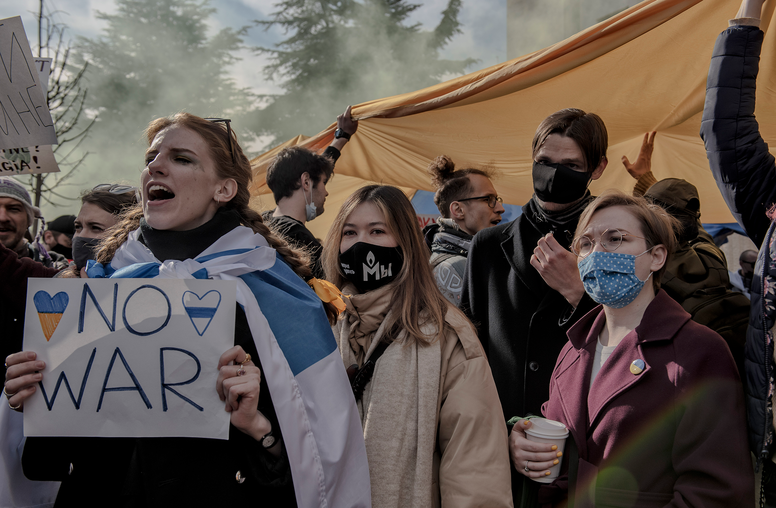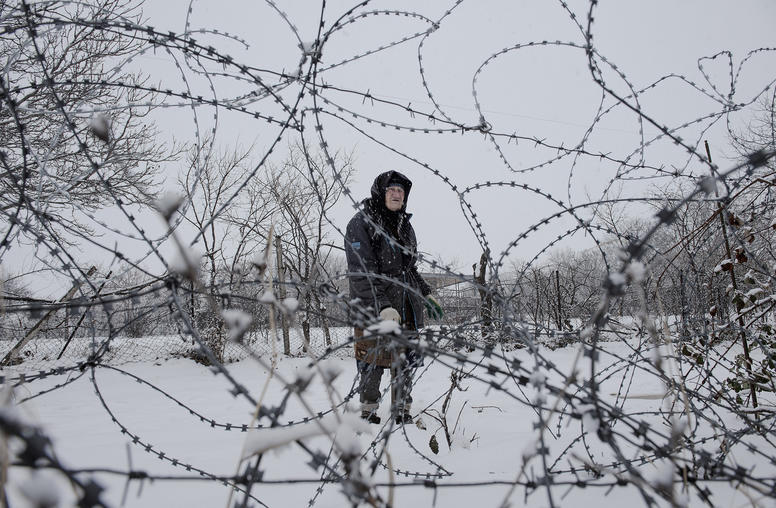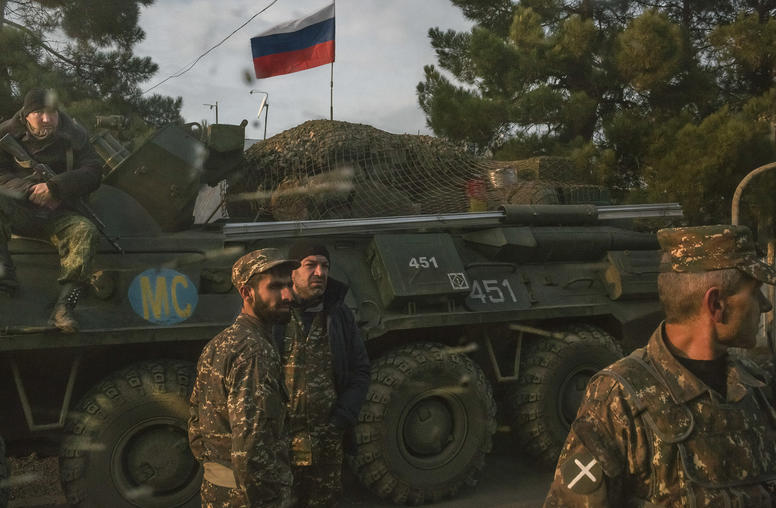On the Issues: Georgia
Recent violence between Russia and Georgia, preceded by Georgia's hostility with South Ossetia and Abkhazia, has led many to reconsider emerging paradigms in conflict analysis and conflict management. Over the past decade, USIP has produced a series of resources and facilitated a number of events and trainings related to the region.
Recent violence between Russia and Georgia, preceded by Georgia's hostility with South Ossetia and Abkhazia, has led many to reconsider emerging paradigms in conflict analysis and conflict management. Over the past decade, USIP has produced a series of resources and facilitated a number of events and trainings related to the region.
Special Reports
- Georgia’s Rose Revolution: A Participant’s Perspective
July 2006
Georgia's Rose Revolution of 2003, the first bloodless change of power in the Caucasus, occurred largely unpredicted by analysts and policymakers. "I did not think to pay serious attention to these young people running around with flags and drawing graffiti on the streets," deposed President Eduard Shevardnadze said shortly after the revolution. "I was wrong," he added. In a this report, Giorgi Kandelaki, noted activist and adviser to President Mikheil Saakashvili, explores what was termed “Europe’s fourth wave of liberation.” - Europe in the 21st Century: A Strategy for Achieving Stable Peace
November 7, 2000
USIP's Working Group on the Future of Europe focused on developing a long-term vision of Europe that is in the best interests of the United States—including managing relations with Russia. In this report, Program Officer Lauren Van Metre discusses the group's central findings. - Managing NATO Enlargement
April 1997
USIP's European Security Working Group aimed to stimulate dialogue among representatives from the administration and Capitol Hill and policy thinkers on how best to manage NATO's enlargement process. This report, by Program Officer Lauren Van Metre, summarizes remarks made at USIP by Dr. Zbigniew Brezezinski and subsequent comments on the subject.
Peaceworks
- Passing the Baton: Challenges of Statecraft for the New Administration
May 2001
This report summarizes discussions at a conference of leading officials and specialists on January 17, 2001. Chapter five, "Why is Partnership with Russia So Elusive," focuses on ties between the U.S. and Europe and Russia after the Cold War.
USIPeace Briefings
- Lessons for the Future of Civic Resistance: Georgia and Ukraine
October-November 2005
In the wake of the peaceful revolutions in Georgia and Ukraine, specialists examined these movements at a USIP event for insights into future nonviolent civic resistance.
USIP Press
- Engaging Eurasia’s Separatist States: Unresolved Conflicts and De Facto States
2004
Author Dov Lynch draws on extensive travel within Eurasia and remarkable access to leading figures to spotlight the secessionist movements in South Ossetia, Abkhazia, Transnistria and Nagorno-Karabakh. He also evaluates a range of options for settling these conflicts.
Image on right: Russian soldiers leave Georgia's separatist-controlled territory of South Ossetia and ride into Russia's North Ossetia on Aug. 26, 2008. (AP Photo)
 Events
Events
- Russia and the West
September 2008
On September 25, a panel of experts discussed key aspects of the relationship between Russia and the West in light of the conflict in Georgia, including the "ghosts of history" that mark the political landscape in the Caucasus, whether a new "Cold War" is at hand and NATO's future direction.
Listen to audio from this event - Frozen and Forgotten Conflicts in Post-Soviet States
July 2004
On July 22, 2004, USIP hosted a presentation by senior fellow Ceslav Ciobanu on "Frozen and Forgotten Conflicts in Post-Soviet States." He examined how the enlargement of NATO and expansion of the EU to include former Soviet republics has created new opportunities to manage conflicts within these states and to build security and stability among the states of the Black Sea, South Caucasus and Caspian Sea regions.
- REACT Online Course
This online course was prepared by USIP on behalf of the State Department and is required for Americans seeking positions with the Organization for Security and Cooperation in Europe. REACT provides an introduction to and description of OSCE, including historical background, current context, and institutional structure. It also includes a basic introduction to conflict-management skills, as well as analytical/historical background on active and potential conflicts in Eastern Europe, Southeastern Europe, Central Asia, and the Caucasus—including Georgia. - Negotiation and Diplomatic Skills: OSCE Mission to Georgia
November 2007
Ted Feifer of the Institute's Education and Training Center/International worked with 19 OSCE Mission to Georgia staff in Tblisi to enhance their peacebuilding skills. - OSCE Professional Development Training in Georgia
October-December 2002
Institute Trainers conducted three Negotiation and Diplomacy Skills Trainings for the Organization for Security and Cooperation in Europe.
USIP's grants related to the region have focused on civil society, analysis of the conflict and peace education.
- The Logic of Violence During Insurgencies (2006)
Jason Lyall, Princeton University
This study investigated sub-national variations in duration, brutality and geographic spread of violence in civil and ethnic wars with a focus on Chechnya and the surrounding region, including Georgia. It combined Geographic Information Systems satellite imagery with events data and interviews on more than 600 sites and analyzed the impact of different state tactics on insurgent violence. - Making Peaceful Change: People Power in Serbia, Ukraine and Georgia (2005)
Jane L. Curry, Santa Clara University
This project focused on the peaceful mass demonstrations that brought down authoritarian regimes in Serbia, Georgia and Ukraine. Its sought to understand the demonstrations’ dynamics in terms of demonstrators’ motives, organization, expectations, lessons learned, and why they were rapidly alienated from their new leaders. - Missed Opportunities? Regime Change and Intractable Conflict in Georgia, 1918-2005 (2005)
Cory D. Welt, Center for Strategic and International Studies, Russia and Eurasia Program
A research project on Georgia's conflicts with South Ossetia and Abkhazia, this effort provided the first comprehensive, analytical overview of these conflicts from their beginnings in 1918 through the "Rose Revolution" of 2003. The study assessed why Georgia’s relationships with Armenian- and Azerbaijani-populated regions in the country have been marked by little conflict, while ties with South Ossetia and Abkhazia are punctuated by violence. - Peace Education in Secondary Schools in Abkhazia (2002)
Katarzyna Wargan, United Methodist Committee on Relief (UMCOR)
This educational project developed and implemented a series of peace education classes and conflict resolution training for 16 teachers and 320 students in eight Abkhaz high schools. Designed to enhance the participants' ability to deal with conflict in a peaceful and democratic way and defuse the potential for future conflict, the effort involved a multi-ethnic group of teachers and students from Abkhaz, Russian, Georgian and Armenian schools. The project produced a conflict resolution manual titled “Fifteen Steps to Peace.” - NGOs and Mass Media Strategies in the Georgian-Ossetian Conflict Resolution Process (2001)
Irene Tsintsadze
This project aimed to stimulate the conflict resolution process in the Georgian-Ossetian conflict. It engaged mass media and NGOs from both sides to analyze past and current conflict resolution efforts and develop and raise awareness of a plan to engage civil society groups. In addition to the strategic plan, the participating organizations aimed to produced six issues of a joint Georgian-Ossetian electronic bulletin, each focused on a different topic, and develop a website about the conflict. - For Peace in South Caucasus (2000)
Ucha Nanuashvili, P.I.C. Alternative
This project aimed to provide training and technical assistance to indigenous NGOs for peacemaking in the Caucasus. A major component of the effort was the development of library resources on conflict prevention and resolution and confidence building. - Phase Three Self-Sustainable Informal Dialogue (2000)
Arthur Martirosyan and Keith M. Fitzgerald, Conflict Management Group
This three-phased project trained new parliamentarians from South Ossetia in negotiation and conflict resolution. The aim was to facilitate dialogue between government leaders from both Georgia and South Ossetia. - Helping the Helpers: Experiential Training for Georgian and South Ossetian Aid Workers (1999)
Vamik D. Volkan, University of Virginia
This program for Georgian and South Ossetian psychologists and teachers enabled these professionals to diminish the effects of trauma among displaced children from South Ossetia. The project resulted in a manual called "Helping the Trainers: Experiential Training for Georgian and South Ossetian Aid Workers, 2000-01."



